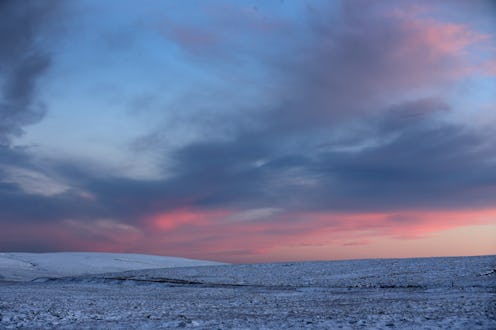
If you're looking forward to a long winter's nap, winter solstice — the longest night of the year — is Dec. 21. Whether or not the winter solstice affects your sleep is up for debate, though some people do report sleeping longer during winter's endless nights. Most likely because it seems to be dark all the freakin' time. Seriously, long winter nights can do a number on your mind. When the sun starts setting before 5 p.m., you might feel like going to bed at 8 p.m. because it's been dark for hours. In the summer, darkness doesn't start to descend until much later, which means you're likely to stay up longer.
I grew up in Ohio, on the very edge of the eastern time zone, which meant that on the longest day of the year it was light outside until almost 10 p.m. However, when I lived in Maine, the state on the opposite edge of the eastern time zone, the sun began to set in the winter before 4 p.m. This mean I usually went to work, and came home, in total darkness during the height of winter. And, it literally always felt like it was time for bed. The long months of the seemingly never-ending Maine winters required a Lorelai Gilmore amount of coffee in order to stay upright.
Do You Sleep Better During The Winter Solstice?
While it may not be a huge amount of extra sleep, experts say that you might get a few additional minutes of Zzzs during those long winter nights. "I would say that, yes, the changing day length [over the year] does influence sleep," Brant Hasler, a sleep expert and assistant professor of psychiatry at the University of Pittsburgh, told Live Science. "[It's] probably not enough to notice a day-to-day difference with regard to the winter solstice and the days before and after, but certainly in comparison to the summer solstice."
Another reason you might sleep more around the winter solstice is seasonal affective disorder, or SAD. In Maine, where the days are oh so short, SAD is a much-discussed topic, and suffering from SAD can make you want to stay in bed longer. "Symptoms include changes in appetite with cravings for sweet and starchy foods, weight gain, a 'heaviness' in the arms and legs, reduced energy levels, fatigue, a tendency to oversleep, difficulty concentrating, irritability, increased sensitivity to social rejection, and a tendency to avoid going out at all," Julia Bayly reported for the Bangor Daily News.
If you're someone who needs light to get up and be productive, you might find it more difficult to rise in the morning during the winter, and you could be more likely to forego evening activities because the darkness is dragging you down. Basically, winter in a cold, dark climate is a great time to catch up on all of the Netflix marathoning you missed during the summer when you were out catching every possible ray of sunshine to stock up for winter. It's also perfectly acceptable to marathon Stranger Things from the warm comfort of your bed, preferably with a weighted blanket, which is known to reduce stress and anxiety, and help you sleep more soundly.
The Winter Solstice Is A Time To Relax & Rejuvenate
And, there is no need to feel bad about getting more shut-eye. Goddess Gift E-Zine noted that the winter solstice is a perfect time to follow mother nature's example by relaxing and rejuvenating. "[T]he true calling of the winter solstice, a day that marks the birth of so many sun gods and goddesses, is a call to slow down and collect our energy in readiness for the bigger, brighter things to come."
So, if winter's dark days have you feeling all dark and twisty, keep in mind that hibernation is important so you can be all bright and shiny come the spring equinox. "The Goddess offers us the opportunity to slumber, to dream — all in preparation for the growth and change that is to occur in our lives when spring makes its high voltage appearance in our lives," Goddess Gift wrote.
The bottom line? If you find yourself sleeping a little more than usual in the days leading up to the winter solstice, it's totally normal. If you think you might be suffering from SAD, you can do a few things to make your home a sanctuary that combats SAD, and makes your days inside feel a little less oppressive. Otherwise, enjoy your long winter's nap. You've earned it.